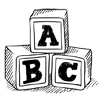Introduction: Wooden blocks have stood the test of time as one of the most beloved and enduring toys in childhood history. These simple yet versatile building blocks offer countless opportunities for creative play and educational development. In this blog, we’ll explore the timeless appeal of wooden blocks and their significance in modern learning and child development.
- Open-Ended Play: Wooden blocks promote open-ended play, allowing children to construct and deconstruct structures without limitations, encouraging imagination and creativity.
- Fine Motor Skills: Handling and stacking wooden blocks develop fine motor skills and hand-eye coordination in young children, preparing them for more complex tasks in the future.
- Spatial Awareness: Building with wooden blocks helps children understand spatial relationships and dimensions, enhancing their spatial awareness and cognitive abilities.
- Math Concepts: Wooden blocks can be used to introduce basic math concepts such as counting, sorting, and patterns, making learning enjoyable and accessible for young learners.
- Social Skills: When children build together, they learn essential social skills like cooperation, communication, and problem-solving, fostering positive interactions and teamwork.
Conclusion: Wooden blocks have retained their popularity across generations due to their timeless appeal and positive impact on child development. By promoting open-ended play, fine motor skills, spatial awareness, math concepts, and social skills, these classic toys continue to serve as valuable tools in modern learning, providing children with a well-rounded and enjoyable educational experience.








